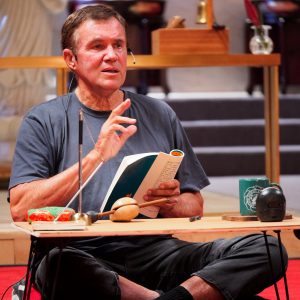
Adapted from a talk by Doug Powers to DRBU students
What are the essentials of self-cultivation? Self-cultivation should be aimed at the whole human – being comfortable in yourself. This means that you are able to be with other people and not seek to get anything from them or try to get away from them. In fact, you should not think that self-cultivation is something you do for yourself by yourself separate from the world. Instead, see the time you take out of your day for your internal process as preparing the mind to engage with the conditioned world.
This is exactly why I think it is better to practice in a community. If you don’t, you are likely just pretending you are not in a conditional field. That makes things unrealistic. Self-cultivation then remains merely a mental idea. You would just be idealizing or romanticizing. That is not what self-cultivation is about. Rather, you should be realistic about practicing within the conditions around you at any given time. If you don’t, then this can lead to real problems. Rather than moving toward the truly human, this becomes another distortion. Self-cultivation merely within your own process, without reference to something outside of you, becomes an egocentric and narcissistic trip. It stifles the human element, leads away from a deep sense of ease in yourself, and instead, from my observation, tends to make people uptight, judgmental, and defensive. I don’t see that as a very comfortable human existence. It’s not a very appealing state.
Of course, there are also elements to self-cultivation at other levels—obviously, there’s a claim for metaphysical elements, you know. I am not saying self-cultivation is only on this one level, in interaction with others. But our basic human nature should be our starting point. Based on that, we can then judge to some degree the outcome of cultivation based on the markers of basic human existence: not being needy or going after people and searching for people; instead, you’re comfortable with people. You’re not trying to get away from them. You’re not going towards them. You’re just kind of comfortable. So, you always have to test your internal cultivation in your interactions with other people.
Self-cultivation is an internal matter, obviously. It is something that you do within yourself, and also by yourself. But, you always have to test your internal practice in actual interactions with other people—how well is that going?
That is where you really get to see if you are making any headway in your cultivation. The real proof is in how you are doing in your engagement with the conditioned world in which we live at any given time. In the Mahayana context, you cannot avoid that engagement and simply separate yourself from the conditioned world. Cultivating by yourself is pretty stultified. It isn’t Mahayana practice. No matter what your practice is, eventually, it has to be brought forth and start to help people in your immediate surroundings, slowly moving toward helping more and more beings to be free from suffering.
It is true that you have to spend a lot of time on your own process. Instead of doing that for years at a time, it is better if you do it for a couple of hours every day, ideally in the morning when you are starting your day, and then go on to engage the conditioned world again. But do not see that time spent cultivating as something that exists in isolation, as a chance to get away from everything. See it as a chance to cultivate a state of mind that can be at ease as you engage in everything that comes up during the day.
If you think of your practice as something you do in isolation, that just creates an isolated identity. I don’t think that’s where we want to go. Instead, if your self-cultivation is finetuned in community, that is where really meaningful qualities come in, such as deep listening, accordance with situations and people, and doing your own part without having to be patted on the back every second. That way, interactions become a natural process of exchange. You are not needy or averse but have an evenness and solidity of mind. From that fundamental mind, all the other virtuous qualities arise spontaneously.


